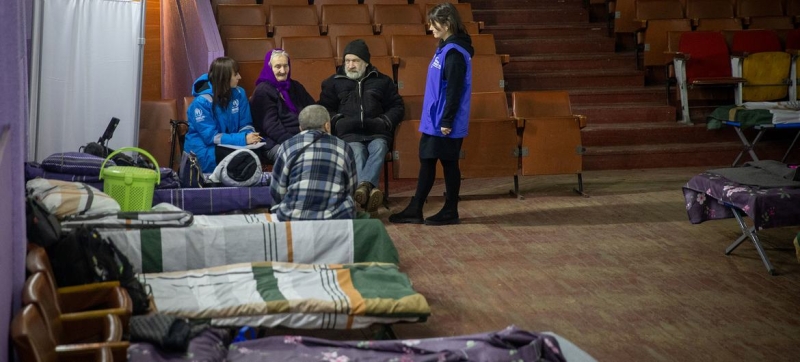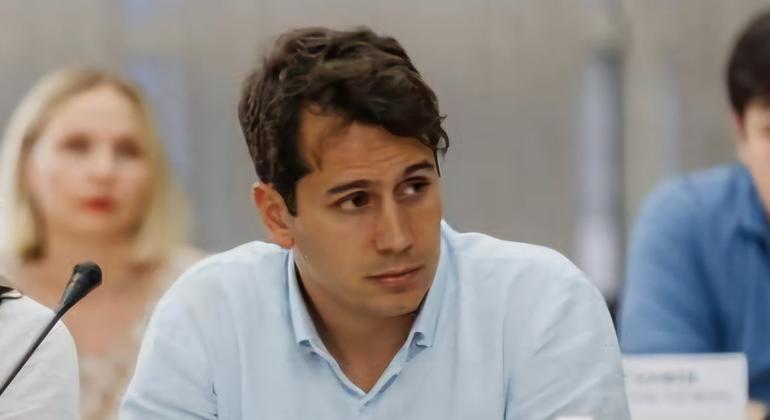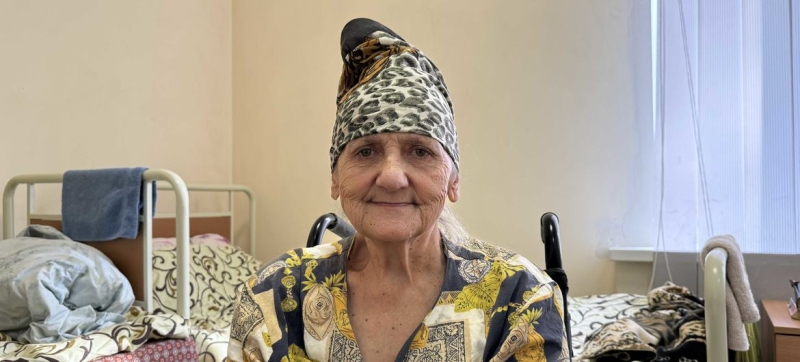
UNHCR staff speak with displaced people from the Donetsk region at a transit center. The UN supports Ukrainians making a difficult decision: to leave or stay in front-line areas Humanitarian aid
Over the past year, more than 250 thousand people left the Donetsk region of Ukraine. Evacuation continues in neighboring regions – Dnepropetrovsk, Kharkov, Sumy and Zaporozhye. The front line continues to change constantly, forcing people to leave their homes. United Nations Refugee Agency (UNHCR) staff are providing support to both evacuees and those remaining in frontline areas.
The head of the UNHCR office in Dnipro, Federico Sersale, told the UN News Service that most of those remaining are elderly or people with disabilities. Some refuse to leave because they fear they will never return home. Others simply cannot evacuate on their own and need help.
Difficult choice
Life in the front-line areas is extremely harsh: constant shelling, interruptions in the supply of electricity, heat and water, lack of opportunity to move freely. But despite all this, convincing the people who remain there that they need to leave can be very difficult.
“I think the main thing is to remember that it is their choice: to leave or to stay. We try to provide them with as much information as possible so that this decision is informed,” Sersale noted.
UNHCR support
UNHCR staff and partner organizations continue to provide the necessary assistance to those who decide to stay.
“When we have access to these areas, we provide different types of support – from basic items such as warm blankets to materials to repair housing damaged by shelling. We also provide psychosocial support and legal assistance.”

The most vulnerable of those evacuated usually end up in transit centers – government facilities where they can spend a few days in safety, receive basic services and then continue on their way.
“46 percent of people passing through such centers are elderly or people with limited mobility. This is a new trend,” said Sersale. We also provide people with services including psychosocial and legal support, as well as cash assistance, to help them meet essential expenses. It all depends on what needs arise,” he said.
“Eyes full of hope and strength”
Svetlana, an elderly resident of one of the front-line districts of the Zaporozhye region, moving in a wheelchair, ended up in one of these transit centers located south of the Dnieper. She and her husband refused to leave for a long time and lived in extremely difficult conditions: there was no electricity in the house, and drones regularly flew nearby. Several weeks ago, when the situation in the region worsened, Svetlana finally decided to leave.
She spent several days in the transit center and received the necessary help, including money. She was later transferred to the UNHCR-supported Ocean of Good Center in Dnipro. The organization provides temporary housing to displaced people, including people with disabilities like Svetlana.

A few weeks ago, Svetlana decided to leave the front-line region of the Zaporozhye region.
“That’s where I met her. This is a temporary solution. Now she is waiting for the opportunity to move into more permanent housing,” said Federico Cersale.
“When I saw her, I was struck by her energy. Despite everything she had been through, there was still hope and vitality in her eyes,” he added.
Long-term solutions
One of the biggest challenges for internally displaced people like Svetlana remains finding long-term solutions – housing and comprehensive, systemic support.
“This could be living in a nursing home, receiving care at home, being able to be in your own home, but still receive the necessary services,” Sersale explained.
“Housing for internally displaced people is one of the key problems,” he emphasized. “We are actively working in this direction.”
While Svetlana decides where she can live in the future, UNHCR continues to support her and others displaced people.
“I think her story very accurately reflects life on the front line: a person has to make an agonizingly difficult decision – to leave or stay, and then find the strength to start all over again.”
